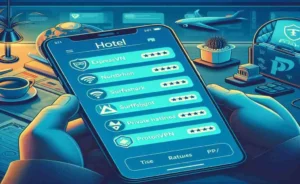Using public WiFi at hotels can be risky without taking proper security precautions.
Connecting to unsecured networks provides opportunities for hackers to steal your data. Using a virtual private network (VPN) encrypts your internet traffic and hides your IP address and location.
This article discusses the top factors to consider when choosing a VPN for hotel WiFi and reviews the best VPNs to use based on security, speed, server locations, ease of use, and cost.
Why use a VPN on hotel WiFi?
Hotel WiFi networks are convenient for guests but often lack stringent security protocols.
When you connect to hotel WiFi, all of your online activity and sensitive information like passwords, bank details, etc. can be exposed.
Using a VPN prevents snooping by encrypting all internet traffic in a tunnel between your device and the VPN server. This protects your data from being intercepted.
A VPN also hides your real IP address and physical location, providing anonymity. With a VPN, you can use hotel WiFi safely for shopping, banking, and accessing company networks without worry.
Top 5 VPNs to use for Hotel WiFi
Based on the criteria above, here are the best VPN options to use with hotel WiFi:
1. NordVPN
NordVPN is a top choice for hotel WiFi with robust security protocols, 5000+ fast servers worldwide, and easy-to-use apps.
Plans start at only $3.39/month. Servers are optimized for speed, and NordVPN has useful features like Onion Over VPN and split tunneling.
Pros:
- Very fast speeds with 5000+ servers worldwide.
- Strict no-logs policy and Panama-based headquarters outside surveillance alliances.
- Advanced security features like Onion over VPN and obstructed servers.
- Allows 6 simultaneous device connections.
- 24/7 live chat support.
Cons:
- More expensive than some competitors at $3.39/month.
- No free trial is offered.
2. ExpressVPN
With 160 server locations across 94 countries, ExpressVPN offers blazing speeds and reliable connections everywhere.
It uses the latest encryption and has user-friendly apps for all devices. At $8.32/month, it’s affordably priced.
Pros:
- Lightning-fast speeds with 3000+ servers in 94 countries.
- Top-tier AES-256 encryption.
- Split tunneling feature to customize which apps use VPN.
- 30-day money-back guarantee.
Cons:
- On the pricier side at $6.67/month.
- Only allows 5 simultaneous connections.
3. Surfshark
For a budget-friendly VPN under $2.49/month, Surfshark is ideal for hotel WiFi security.
It offers private DNS and leak protection, plus it allows unlimited simultaneous connections. With over 3200 servers in 65 countries, speeds stay fast for browsing and streaming media.
Pros:
- Cost-effective at under $2.49/month.
- Fast connection speeds.
- Allows unlimited device connections.
- Has a whitelister feature to bypass VPNs for certain apps or sites.
- 30-day money-back guarantee.
Cons:
- Smaller server network than competitors.
- Based in the British Virgin Islands, which some view as having questionable privacy laws.
4. Private Internet Access
PIA is a reputable VPN known for not keeping any connection logs.
It uses AES-256 encryption by default and provides anonymous payment options. The desktop and mobile apps are easy to set up. Monthly plans start at $11.95/month.
Pros:
- Strict no-logging policy.
- Very affordable at $2.69/month.
- Supports port forwarding for torrenting.
- Allows 10 simultaneous connections.
- Accepts gift cards and crypto for anonymous payments.
Cons:
- There are fewer server locations than other top VPNs.
- There is no split tunneling feature.
- Websites and apps have dated designs.
5. CyberGhost
With strict no-logging policies and military-grade encryption, CyberGhost is a secure, low-cost option.
One subscription covers 7 devices, making it perfect for families traveling together. Speeds are reliable for HD streaming and lag-free gaming.
Pros:
- Low cost, starting at $2.03/month.
- No traffic or activity logs were kept.
- Impressive speeds with 7000+ servers.
- Intuitive apps with auto-connect features.
Cons:
- Based in Romania, which has mandatory data retention laws.
- Lacks the advanced configurations of other VPNs.
- No split tunneling feature is offered.
Factors to Consider When Choosing a VPN for Hotel WiFi
When picking a VPN for travel, there are several key factors to evaluate:
Security Protocols
Look for VPNs that offer high-level encryption through protocols like OpenVPN and IKEv2/IPSec.
These make it nearly impossible for hackers to decrypt your data. Avoid services using weaker protocols like PPTP or L2TP.
Speed
VPN encryption can slow your connection, so select fast VPNs that won’t bog down your web browsing and streaming. Top services have large server networks that optimize speed by routing your traffic efficiently.
Number of Server Locations
More server locations mean you can switch to servers in the country you’re visiting for faster speeds. Robust VPNs have 1000+ servers in 50+ countries.
Ease of Use
VPN apps should be user-friendly with one-click connect features. They should run seamlessly in the background once connected.
Cost
Hotel WiFi use may be limited, so an inexpensive VPN is ideal. Monthly plans around $5–10 per month are most cost-effective.
Is it safe to use public hotel WiFi without a VPN?
Using a hotel’s public WiFi network carries risks, but connecting through a trusted VPN service can make it much safer.
Without a VPN, your data is unencrypted over hotel WiFi and could be intercepted by hackers on the same network. They can steal passwords, financial information, and other sensitive data you transmit when checking email, shopping online, accessing your work network remotely, etc.
By routing your connection through an encrypted VPN tunnel first, you add a critical layer of protection.
A good VPN will encrypt all internet traffic between your device and their servers using AES 256-bit or higher encryption. This makes it nearly impossible for anyone else on the hotel WiFi to decrypt and read your data.
A quality VPN also hides your real IP address, masks your physical location, and prevents tracking. Using a hotel’s WiFi through a VPN lets you browse more anonymously and avoid targeted location-based ads or surveillance.
While no public WiFi can be 100% safe, connecting via a reputable VPN like ExpressVPN or NordVPN before accessing hotel WiFi can greatly minimize risks and allow you to use the network more securely.
Just make sure to choose a provider with robust encryption, a no-logging policy, and fast speeds to maximize both security and usability when traveling.
Tips for Using a VPN on Hotel Wi-Fi
To maximize security on hotel networks, follow these tips:
- Connect VPN before connecting to WiFi: Activate your VPN first to cloak your device and encrypt the WiFi session.
- Use VPN kill switch: This disconnects your internet if the VPN drops to prevent data leaks.
- Enable always-on VPN: This automatically connects to VPN when accessing WiFi for hassle-free security.
- Use HTTPS sites: Encrypted HTTPS websites add another layer of protection for sensitive browsing.
- Avoid public computers: Public hotel business center computers may have malware. Use your private device with a VPN instead.
Conclusion
Hotel WiFi provides convenience for travelers but lacks the robust security of private networks.
Using one of the top VPNs above adds a critical layer of protection by encrypting your internet traffic and hiding your IP address from prying eyes.
With the right VPN, you can securely access the internet from your hotel room like you would at home.
Before traveling, download a trusted VPN app like NordVPN or ExpressVPN to safeguard your next hotel stay.
FAQs:
Can the hotel see my browsing if I use their WiFi?
Yes, the hotel can monitor all unencrypted internet activity on their WiFi without a VPN. They can see websites you visit, apps used, and even account passwords entered over HTTP.
Can I be hacked when using hotel WiFi?
Yes, without a VPN, hackers on the same network can more easily steal passwords, banking details, and other sensitive data you transmit over hotel WiFi. A VPN makes hacking virtually impossible.
Is it illegal to use a VPN on hotel WiFi?
No, using a personal VPN is perfectly legal. VPNs encrypt your traffic but do not enable illegal activities prohibited on hotel networks, like copyright infringement.
Will a VPN slow down my hotel WiFi speed?
Minimally. A good quality VPN causes less than a 10–20% speed reduction in most cases. Top services like ExpressVPN optimize servers for speed to minimize impact.
What’s the best free VPN for hotels?
Free VPNs often have privacy and security downsides. For hotels, the best options are low-cost commercial VPNs like Surfshark and Private Internet Access, which offer full protection.




